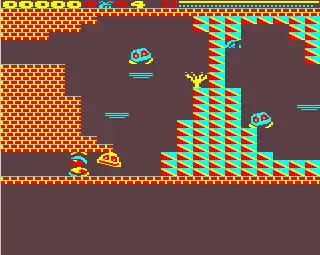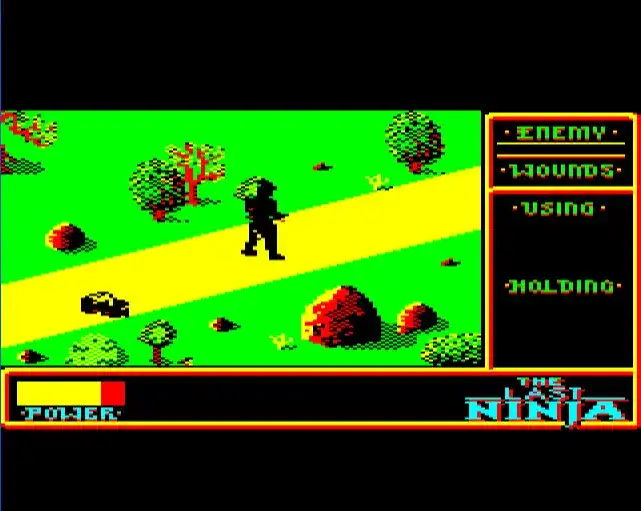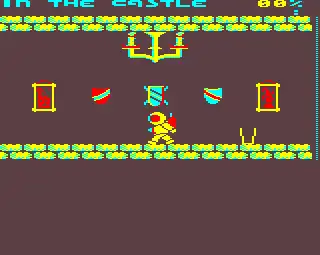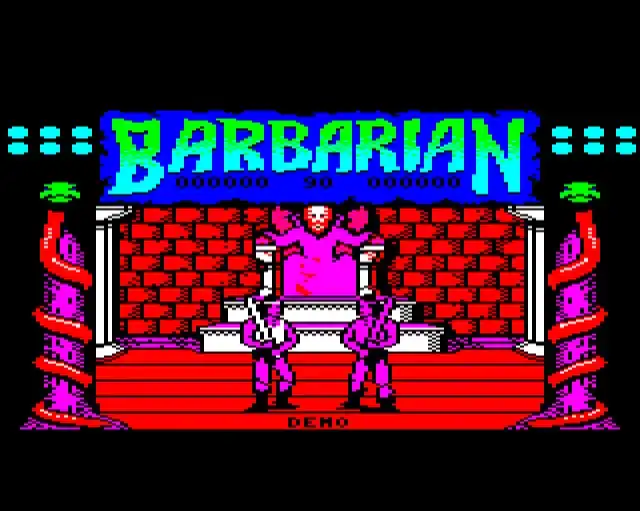beebgames.com
Last Updated 12th May 2024
The BBC Games Archive - digital memories
beebgames.com
Interview with Peter Scott
Peter Scott was one of the most prolific programmers on the Beeb and recently I had the opportunity to ask him a few questions on the art of programming and how he and Gary Partis became famous.
Peter Scott Beeb softography:
- Yo-Yo (ASL) - 1985
- Thunderstruck (ASL) - 1986
- Quest For Freedom, Electron Only (IJK) - 1986
- Thunderstruck II: The Mindmaster (ASL) - 1986
- Last Of The Free (ASL) - 1986
- Thunderstruck III: Omega Orb (ASL) - 1987
- Hunkydory (Bugbyte) - 1987
- Ransack (ASL) - 1987
- Barbarian (Superior Software - under Dylan) - 1987
- Spycat (Superior Software - under Dylan) - 1988
- The Last Ninja (Superior Software - under Dylan) - 1988
- Ballistix (Superior Software) - 1989
- Superior Soccer (Superior Software) - 1989
- Ricochet (Superior Software) - 1989
- Barbarian II (Superior Software) - 1989
- The Last Ninja II (Superior Software) - 1989
- Predator (Superior Software) - 1989
- Pandemonium (Superior Software - only available on PAS13) - 1990
- Sim City (Superior Software) - 1990
- Hostages (Superior Software) - 1990
- Network (Superior Software - only available on PAS15) - 1991
How did you first get into games programming and what made you choose the BBC?

Well, I didn't. I chose a ZX-81, a Vic-20, a Dragon, an Oric, a Spectrum, a C64 and wrote magazine-published (aaah, remember those?) games on most of 'em. I did it for two reasons. First, to be creative. I soon realise the creativity took up around 0.001% of programming time. I then did it because it was a challenge. And because I started to earn money from it. After the string of flop computers (see before), I bought an Acorn Electron (couldn't afford a Beeb) and learnt to program that. I s'pose I bought an Electron as it was new and only £200.
As you could access 6502 assembly language, and as Beeb BASIC was and still is, to me the best around, I did better than before. I did an A level in Computer Studies (alongside my mate Gary Partis) and got to program at school. I remember our project Gary wrote a hideously complex school networking project, all 6502 bare- bones programming, something ultimately the school massively depended on. I spent a couple of weeks writing a word processor in BASIC. And we both got 100%, and sold our projects to the county (£175, for unlimited use in every school in Northumberland. We wuz robbed. Although me less than Gary)
And the magazine games turned to proper published games.
What was it that made you decide that you wanted to use a different style in your games, it is very obvious when you see a game whether or not it is a Peter Scott, or is that what you intended?
I dunno, to be honest. I think everyone has a signature style, in most things, from drawing a picture to answering the phone. And that was mine, really. I admired games on other machines more than Beeb ones, and always tried to bring the best bits of those chunky sprites, cute animation, as many colours as possible and simple gameplay to the Beeb as it always lacked those sort of games. My niche, if you like. And that's what got published a lot of my more experimental efforts, attempts at other styles fell by the wayside.
Your programs were published on a wide range of publishers and labels - why was this? Did you not like the idea of settling down with one publisher, or was it just more convenient for you at the various times?
Actually I did really only work for two publishers, ASL and Superior. I stayed with both for a very long time. It's just that my old stuff, the games rejected by the majors, I sent off to minor companies. And they published them. For example, HUNKYDORY was one of my first ever games. It was finally published something like two years into my career, by Bug Byte, a company I didn't even know. And companies sold games to each other I didn't care as long as I got paid.
I have heard that a former managing director of ASL tried to get you to join his new Top Ten label, is this true and if so why did you refuse?
Yeah, an person I used to work for (he says, being careful for legal reasons) set up this new label and wanted me to work for him. I did some work and he ripped me off basically. I then tuned in to a late night TV show about S&M pervs and there he was, in leather, being whipped. Funnily enough, after a call or two, my cheque arrived.
I did have a ridiculous thing released by Top Ten Software THE PETER SCOTT TRILOGY, with three of my oldest games ever, alongside a hideous picture of me treated in some art package. The PR guy kept ringing me up and laughing at me whilst he fiddled with my picture (hello Darryl). A great ego boost which sold 500 copies.
If you could redesign any of your games, which one would you do and why?
Hmmm.. all of 'em, I s'pose. A lot were rushed towards the end they had to be, to meet deadlines and be out in time. Otherwise you'd miss the Christmas or Easter holidays, the time when Johnny Gamesplayer had his dosh to spend. And lose a lot of sales. So I'd make LAST NINJA a bit more varied. I'd made THUNDERSTRUCK 2 well, a lot more playable (as it was too hard and dull at the start). RANSACK was supposed to have a load more levels.. but I ran out of time.
Oh, and the main thing was that I was always contracted to write BBC and Electron versions of games, and the Elly was always crap in MODES 1 and 2, so I used MODE 5 for everything. And a 20 line screen (ish) with the bottom bit covered up, to save on memory. If I'd had time, I could've produced better Beeb-only games. Honest.
During the later years of the BBC Micro and Electron, you did more conversions - was this the way you wanted it and if you wanted to be creative, wasn't this a backwards step?

Well, I throw my hands up in the air, and say I did it for one reason. Money. Yes, it was a backwards step from a creative point of view. But the money was better. Oh, and a second reason. Prestige.
I used to be sent the game normally a C64 or Atari ST disk. No manuals, no help, no nothing. I'd buy magazines to find cheats. I'd then have to play through the game and convert it from sight. Not easy. And with incredibly tight deadlines. I got the gig because I'd say yes before seeing the game, look at it and go pale, slave over it and get something ready on time. And towards the end of the Beeb market, conversions were all that sold. And I needed to earn my crust.
What is the most difficult game you ever worked on?
Had to be SUPERIOR SOCCER, as it needed to have management and arcade elements. In the Beeb's tiny memory. And Richard and Steve were hard to please (as always, and the games turned out so much better because they were) And at the time I knew NOTHING about football. Very difficult.
Did you have a set pattern for creating your games, or did you use different techniques as you went along?
Yes I had a set pattern, a rota if you'd like. For an original game, I'd sit and go through every computer magazine for every format, cutting out pictures that inspired me. And watch movies and TV whatever. Often you'd have ideas in odd places, like the bath or the back seat of a 401 bus. Then I'd do the main character very important, spending days or weeks on it. Then a design, a rough screen. Then a memory map, a bible, so important when every byte is important. I'd spec it out and send it off to the publisher, and we'd talk through what the game could become. And then I'd write it. Of course, it was everything then ideas, sound, graphics, programming, music, bug testing, box design, even some PR eeeh, they don't know they're born nowadays.
Which game are you most proud of, and why?
SIM CITY. Either that or LAST NINJA 2, a completely different sort of game but one that managed to get a 500K C64 multi-load game into a 32K Beeb and Electron. Proud of that too.
But SIM CITY was my one major programming achievement. I was a competent programmer, no better, no worse than many. Gary Partis, for example, was a far better programmer than me. But not being that good had its advantages. I couldn't do that many fancy tricks so I'd try and make the games playable. I didn't want to impress anyone with my technical knowledge, so I tried extra hard on the graphics and sound.
SIM CITY wasn't cute, wasn't easy and simply didn't seem possible. Fitting a 512K game into 20K a game full of artificial intelligence and hugely complex algorithms.. a nightmare. But I think it came out OK. Won awards and stuff. And the original programmer even said he preferred it over the C64 version (a disk-only game with three times as much memory as mine). I was and still am proud of that 'un.
Ricochet was probably your biggest ever original game - is it difficult to keep the enthusiasm for such a large task constant throughout the development?
Well, I'm afraid you're wrong there. RICOCHET was a conversion of an obscure Atari ST game. Wasn't original at all I copied it. An early Psygnosis game, if I remember correctly. We mainly did it to get the rights to some other, more interesting ST games, but the deal didn't come off. It was a doddle, that one, once I'd got the balls bouncing off each other properly. And the scroll routine working. Good fun with two players as well. Mind you, so's noughts and crosses.
Were there any games that inspired or influenced you to write the games you did?
Loads of games, too many to mention. URIDIUM was one mind you, Mr. Partis was slightly more influenced by that one than me (cf PSYCASTRIA). I remember a computer show where Gary got the author of URIDIUM (Andrew Braybrook) to autograph his copy of PSYCASTRIA. Very cheeky. He threw a fit and threatened to sue, if I remember. Heheh.

Anyhow, I loved PARADROID, the Ultimate Spectrum games (THUNDERSTRUCK was inspired by JET PAC). Of Beeb games, I never really got into ELITE (heresy!) all that flying around buying and selling stuff bored the pants off me. I loved REVS though, the one Beeb game that became a bit of an obsession with me. Now I still put my feet up and have a game of GOLDENEYE or MARIO (the best game ever) on the N64.
For some games you chose to write under the name Dylan - why was this?
Ah yes, the Dylan thing. Well I'd signed an exclusive deal with ASL, for a retainer and a nice big fat royalty increase. But they didn't sell many games (mine and everyone else's) despite the games being good and receiving excellent reviews. All down to marketing, PR, crappy boxes and stuff (I seem to remember).
So I sent a game to Superior. SPYCAT all based on the Spycatcher controversy. They liked it and wanted to publish it, except I was contracted 'til 2010 or something to ASL and had to give twelve months' notice. So I sold it under a pseudonym. Not against my contract.. sort of.
I had a bank account and a chequebook under 'Dylan'. Had to sign cheques that way it was very odd, and I got funny looks from any bank except my home branch.
So my first Superior games weren't by me. Or something. As soon as my notice expired I became me again. Erm, yes.
What is the most memorable thing that happened to you whilst you were a programmer? Why did you stop programming?

I'll amalgamate your last two questions as they both go together. I had a lot of memorable times as a programmer, from getting pissed at my first posh computer show to meeting Maria Whitaker and that bloke off GLADIATORS for BARBARIAN as well as a lot of sitting in front of a Cub monitor for hour after hour, 3:00am on the day before a final version of a game had to be delivered, desperately trying to replicate the crash at the end of level 152
The final straw was working on a Nintendo game based on THE SIMPSONS. Can't tell you which one. And it became absurd, as the main programmer had dropped out and I had to write it even though I didn't have a clue about the NES. So the boss brought in a hotshot programmer and sent him up to Newcastle to work with me. And we were being paid more and more money to deliver the game. So we sat back and did no work. And the money went up and up around £900 a week, if I remember right, a helluva lot now, never mind ten years ago. And we drank beer and went to the pub and did tiny amounts of work until the day before the deadline when we delivered the game.
It was a great game, getting over a lot of NES limitations to make it almost as good as the SNES version. But it was never released, as the NES market had collapsed. It made me realise what a ridiculous industry I worked in all that waste, money, time and effort, all for nothing.
My last Beeb games had also been a bit soul destroying. I wrote PREDATOR in four or five weeks, a fairly crap little shoot 'em up, finished right before Christmas. It sold by the barrel load. I slaved for six months on SIM CITY. It sold very few copies. That kinda gets to you all the effort and pride that went into SIM CITY and Arnie's face on the box of PREDATOR wins every time.
So I answered a job ad in a paper, to become a researcher for a TV show called GAMESMASTER. And that led to other jobs in TV, until I'm here now running my own TV company.
And, six years on and a lot of water under the bridge, I'm executive producing a pilot show on technology, and want to do an item on old games a retro slot. I tell the researcher to download some emulators and games on our P400 in the office. Next day I return to see him playing OMEGA ORB, saying how he didn't realise that I used to write games. And I tried and failed to get anywhere in the game, much to his amusement.
I hope you enjoyed this interview, thanks to Peter Scott for letting me do it, and to you for reading it. Look out for more interviews!
(C)2024 C. Boylan